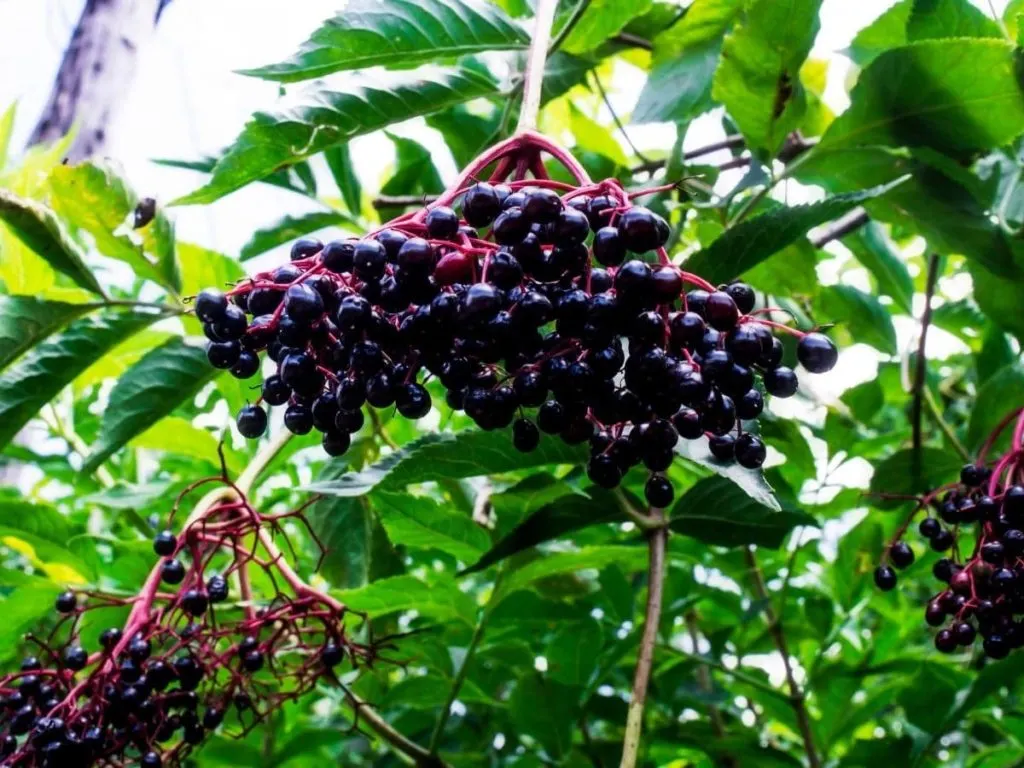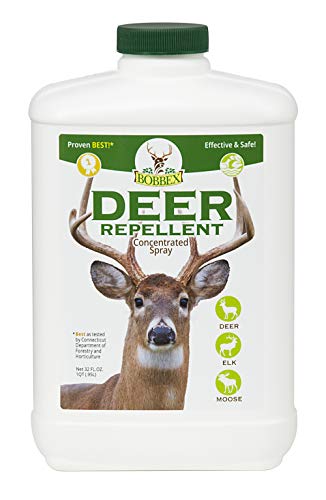Elderberries prefer moist ground, but they can grow in a vast range of soils. So, this makes elderberry bushes and leaves fall in deer’s feeding zones. However, there is a conflict in opinions regarding deer eating elderberries. Scroll down to find out if deer truly eat elderberries or not.
Do deer eat elderberry bushes & leaves?
Deer eat elderberry bushes and leaves. Deer are generally picky eaters, and they will eat what is more palatable to them. While some deer munch on elderberries and elderberry leaves, others choose better alternatives. The geographical location also determines their behavior.
Table of Contents

Elderberries grow best in moist soil and partial shade. It is commonly found in Canada and central to the eastern portion of the United States. It is popular in wildlife.
Deer often traveling in flocks will feed on elderberry bushes and leaves. It provides energy for the time being. Elderberry bushes and leaves have lower nutritional value than berries.
Many gardeners noticed that deer have different eating behaviors in different locations. While deer fed on the leaves, stems, and berries in some places, the trees were left untouched in other areas.
This is because deer are unfamiliar with elderberry bushes and highly likely to avoid them. Deer that are familiar with this plant will feed on it.
Mule deer is no less different than other deer. They will eat the berries and bush. But some mule deer may settle for other high palatable food since they are picky eaters.
Elderberry bushes:
Yes, deer eat elderberry bushes. Even though deer are picky eaters, they prioritize elderberry bushes over other more desirable plants in Tennessee.
But that is not the case for every state. In other places, you will see deer ignoring elderberry bushes.
Elderberry trees and plants:
In places like Pennsylvania, deer are often seen eating elderberry trees and plants. They will even eat the stems and berries of the elderberry plants.
Elderberry leaves:
Deer prefer elderberries over the leaves. However, this does not mean that the leaves are safe from deer strikes. Like previous cases, deer familiar with elderberry leaves will eat them while others simply ignore them.
Is elderberry deer resistant?
Well, it is evident that elderberries are denser in places where deer density is low. The deer resistivity of elderberry plants is quite an interesting topic. The tendency of deer striking elderberries changes geographically.
Generally, elderberry is a deer-resistant plant, but the scenario changes when deer cannot find a good food source alternative. To satisfy their hunger, deer will feed on elderberries and their bushes.
Some common elderberry species are discussed below.
Black lace elderberry:
Black lace elderberry commonly termed “Black Beauty Elderberry,” is best recognized as a deer-resistant plant. However, in times of scarcity, deer may eat this plant.
The berries can be eaten when ripe. Eating in large quantities will cause sickness. Unripe berries are toxic to deer. Deer usually steer away from this plant, so you do not have to worry about deer eating your plants.
Lemony lace elderberry:
Lemony lace elderberry is tremendously deer resistant. This species contains toxins in higher amounts, so it is highly prohibited for consumption.
Lemony lace elderberry attracts birds and pollinators, so it is a top pick for growers who get the best value out of it.
American elderberry:
American elderberries are edible and attract all sorts of pollinators, birds, and wild animals. They are partially deer resistant. Deer wandering in new territories unfamiliar to this plant will ignore it.
While deer familiar with this species will feed on it, it depends on the deer’s eating habits. Picky eaters are more likely to leave this plant alone.
Is elderberry poisonous to deer?
Elderberry is usually termed a deer-resistant plant. While some variants are more resistant than others, on average, all the elderberry plants do resist deer to some extent.
Deer usually settle for a more palatable food source and ignore elderberry. Elderberry is not poisonous to deer in short quantities. Unripe and raw elderberries are toxic to deer.
Deer can eat elderberry, bush, and leaves. Elderberry contains an element that is similar to cyanide. So, consuming elderberries in large quantities could be lethal to one’s health.
Deer are hardly seen eating too many elderberries. The toxins found in unripe and raw elderberries are too much for deer to handle. Deer could unknowingly munch on unripe elderberries and bring their demise.
How to protect elderberry from deer?
You can adopt various ways to keep deer away from elderberry plants. There is nothing as one best solution. You have to improvise and do a combination of the following to keep deer away fully.
Here are some ways you can protect elderberry from deer.
Physical barriers:
Physical barriers are the most effective in keeping deer flocks away from your garden. However, deer are good jumpers. The height of the physical barriers such as fences should be at least 8 to 10 feet tall.
Elderberries spread quite a lot, so fences around the plants would not be viable. You can soak wires in deer repellants and lay them over the bushes.

Deer repellant:
There are various deer repellants available in stores. Spray any deer repellant on the elderberry plants. But remember, you will have to reapply the spray because it washes away in the water.
A bar of soap with a strong scent also does the work. Wrap it with a rope and hang it about the height of a deer’s nose. This will keep deer away from your garden.
Dryer strips also have a strong smell that deters away deer. Keep the strips at a nose level height of deer so that this is the first thing the deer smells.

Planting deer resistant plants:
Deer do not bother with plants like Boxwood, Japanese silver grass. These ornamental plants are highly deer resistant. Planting these plants near elderberry plants will keep deer away.
Maintain a distance between the plants, so both of them get enough nutrition and shade.
What is eating my elderberry leaves?
Various animals feed on elderberry leaves, but insects are most commonly eating all your elderberry leaves.
Aphids:
These small sap-sucking insects are mainly responsible for eating elderberry leaves. They are indifferent to smell so that they will eat the leaves all year round.
Soapy water or essential oils does excellent work keeping them off your plants. A more natural process would be to employ ladybugs or birds.
Deer and other animals:
Deer and other four-footed animals are usually attracted to elderberry leaves during fall. Herbivores are not attracted to the leaves in summer as they emit a strong aroma.
You will find them eating your elderberry leaves whenever they get the chance. Hanging soap in nets or spraying soapy water keeps them away.
Does elderberry attract wildlife?
Even though the fresh leaves, stems, and elderberries contain toxins, it does not deter wildlife from consuming elderberries. Yes, elderberry attracts wildlife.
Elderberries are an excellent source of food for wildlife. Animals get their much-needed vitamins and carbs from elderberries.
Pollinators such as butterflies, bees are easily attracted to elderberries. For this, it becomes a top pick for gardeners.
A wide range of bird species is attracted to elderberries. Turtles and animals like bears, deer, sheep, turkeys, possums, foxes are also seen munching in elderberries. The list goes on. Elderberries provide high value to wild animals.
Consuming in large amounts could make it harmful for some animals. So, herbivores stay clear of this shrub while other four-legged ruminant mammals occasionally feed on them.
What animals eat elderberry bush?
Various animals feed on elderberry bushes. From birds to rodents, many animals eat elderberry bushes if they get the chance, as elderberries are a vital supply of nutrition in the summertime.
Rabbits:
Even though elderberry bush is toxic to rabbits, they eat elderberry bush in tiny amounts. Rabbits will eat elderberries when there is no other good food source available.
Coyotes:
Yes, coyotes eat elderberry bushes and other parts such as elderberries and leaves.
Raccoons:
Similar to coyotes, raccoons also eat elderberry bushes. They eat all the different parts of it.
Foxes:
Yes, foxes eat elderberry bushes and different parts of it. However, foxes will prefer better foods if available.
Final thoughts
Deer are the number one enemy and cause of nightmares of gardeners. These high jumping intelligent herbivores feed on a lot of plants. During crises, they leave their picky eating behavior and settle for whatever they find available. Good protective measures will ensure safety from deer.
